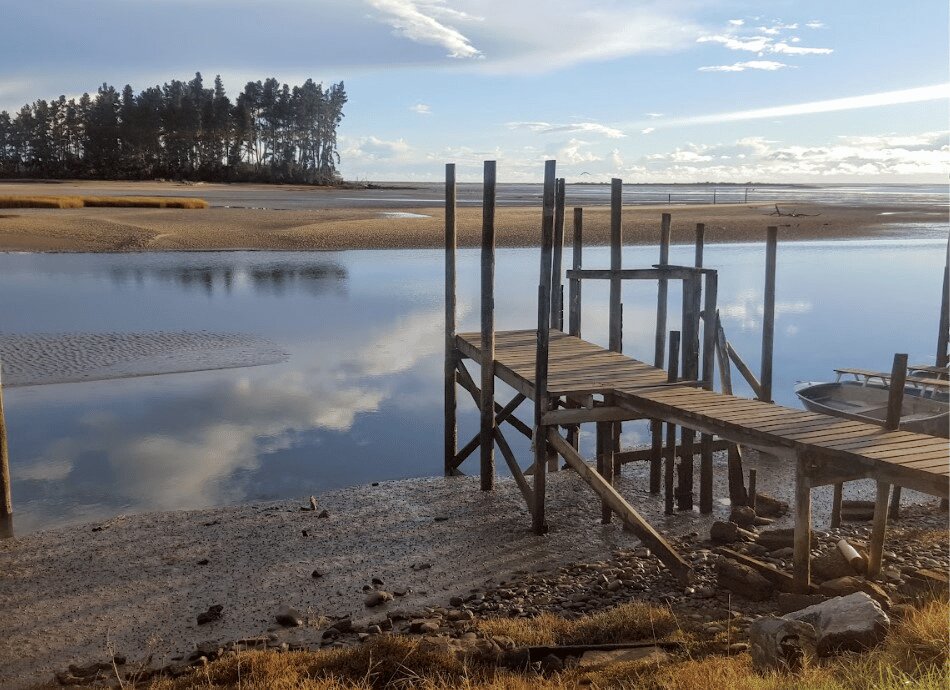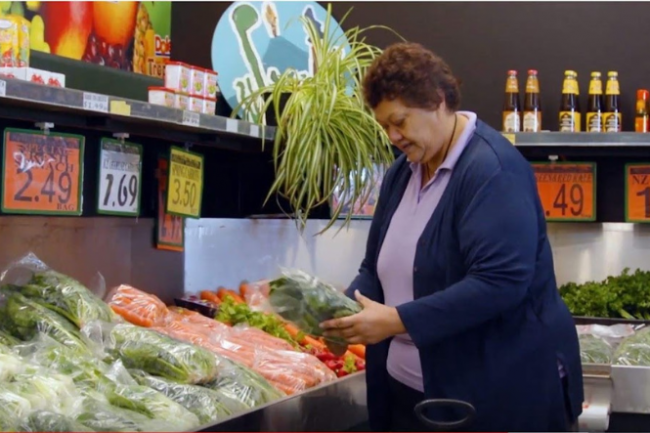Video: Keeping kai on the table
This video was created when COVID restrictions made it harder to source food, however much of the information remains relevant. It may take a few moments to load.

Low or no data? Visit zero.govt.nz, scroll down the page then click on our logo to return to our site and browse for free.

This video was created when COVID restrictions made it harder to source food, however much of the information remains relevant. It may take a few moments to load.
New Zealand has no shortage of kai/food. In fact, we produce food for 40 million people but we do have problems with food insecurity. Almost 40% of adults and 19% of children in don't have enough food.
Food insecurity means not having reliable access to enough safe and nutritious food that meets personal and cultural needs. In practical terms, it means:

Image credit: Healthify He Puna Waiora, NZ
Around the world, food insecurity results from many things. These include war, when supplies of food are disrupted, and climate change which also disrupts food supplies when extreme weather events cause crop failures. COVID-19 caused problems with the production and distribution of food.
In New Zealand, access to good and affordable kai is connected to income and some groups suffer more than others. Whānau living on lower incomes are more likely to have problems finding good, affordable food and those on benefits struggle even more. It has always been a problem in our communities but got worse due to COVID-19 and the associated job losses and rising costs of living. It is estimated to cost between $29 and $74 a week to feed a person, depending on age and sex.
In 2019 the Auckland City Mission estimated that at least 10% of New Zealand’s population was food insecure with women, people with disabilities and Māori communities and Pacific people most affected.
Food insecurity is not just about going hungry, it is also a major barrier to healthy eating. It forces people to fill up on cheap and highly processed food which costs about a third less than nutritious food. Over time, eating unhealthy food increases your risk of developing long-term conditions, eg, obesity, diabetes, heart disease and some cancers.
Access to good food is especially important for your tamariki/children. Without adequate nutrition there can be problems with their growth and development which can lead to health and education problems. Just some of the problems that can arise include child obesity, asthma, poor academic performance, and developmental and behavioural problems.
Parents of children who live with food insecurity suffer additional hardships. They often go without food themselves to feed their children and suffer stress, shame and psychological distress at not being able to feed their whānau.
Reach out to your whānau who may know where you can go to get awhi manaaki.
The New Zealand Foodbank Directory
https://www.foodbank.co.nz/foodbanks(external link)(external link) You can find and contact your local food bank to make an appointment or arrange delivery of a food parcel if you are in need of food assistance or in self isolation.
The Auckland City Mission
www.aucklandcitymission.org.nz(external link)(external link) 23 Union Street, Auckland Central. Phone: (09) 303 9200. Email: info@aucklandcitymission.org.nz
The Mission provides immediate assistance, such as food, clothing and bedding. Staff also work with individuals or families to find workable, long-term solutions to the issues they face.
Paerangi
https://paerangi.nz/services/kai-food-banks(external link)(external link) Paerangi offers many useful options for links to kai and food banks with the additional option of selecting the information in Te Reo or New Zealand sign language.
The Salvation Army
www.salvationarmy.org.nz(external link)(external link)
Facebook page www.facebook.com/SalvationArmyNZFTS(external link)(external link) Phone: 0800 53 00 00
The Salvation Army provides emergency food and clothing, advocacy, referral, court support services and financial mentoring. Their mentors work with individuals or with whānau to provide coaching. They can draw up spending and saving plans, talk to creditors and provide advocacy to government agencies.
Counties Manukau
https://countiesmanukau.health.nz/assets/Covid-19/CMH-Website-Food-and-Other-Emergency-Supplies.pdf(external link)(external link) This link provides multiple options for food and emergency support in Counties Manukau.
West Auckland
https://waitakere.org.nz/food-parcels/(external link)(external link) This link provides many options for food and emergency support in West Auckland
Pātaka Kai Open Street Pantries
www.patakai.co.nz/auckland-pantries.html(external link)(external link) Email: kaipataka@gmail.com
Facebook www.facebook.com/groups/openstreetpantrys(external link)(external link)
The Pātaka Kai Open Street Pantry Movement is a resident led, grassroots, crowd sourced solution to immediate and local need, rescuing food and encouraging the co-sharing between neighbours to strengthen communities. The website shows nearby open street pantries.
Vision West Community Trust
www.visionwest.org.nz(external link)(external link) 97 Glendale Road, Glen Eden, Auckland 0602. Phone: (09) 818 0700. Email: office@visionwest.org.nz
VisionWest provides comprehensive wrap-around services, including emergency food support, numeracy and literacy education, one to one support with transition into further education and/or employment. They also offer housing support and financial guidance as well as youth coaching and mentoring for eligible youth.
https://visionwest.org.nz/pataka-kai/(external link)(external link) Vision West also has Pataka Kai which offers food parcels.
Huakina Development Trust
huakina.co.nz(external link)(external link) 15/17 Roulston Street, Pukekohe, Auckland 2120. Phone: 09 237 3324 Email: C19@huakina.co.nz (for COVID response) or admin@huakina.co.nz
Huakina Development Trust provides food assistance for isolating whānau.
Manurewa Marae
Manurewa Marae Facebook page 81 Finlayson Avenue, Clendon, Auckland 2103. Phone: 09 267 8768
Manurewa Marae provides kai packs as well as other support programmes and services.
Papakura Marae
www.papakuramarae.co.nz(external link)(external link) 29 Hunua Road, Papakura, Auckland 2110. Phone: 09 297 2036
Papakura Marae provides a food and clothing bank and whānau ora services.
Whānau Ora
whanauora.nz(external link)(external link) Phone: 0800 929 282. Email: info@whanauora.nz
Whānau Ora provides kai, hygiene packs and other support services.
Paerangi
Kai and food banks(external link)(external link) in Engish, te reo and NZSL.
Beneficiaries Advocacy and Information Service (BAIS)
www.bais.org.nz(external link)(external link) Phone: (09) 444 9543. Email: info@bais.org.nz
BAIS provides free, independent, professional information and advocacy to beneficiaries and low income families on their financial entitlements with WINZ and IRD. BAIS operates on the North Shore and in Rodney.
Christians Against Poverty
www.capnz.org(external link)(external link) 55 Hugo Johnston Dr, Penrose. Phone: 0508 227 111. Email: info@capnz.org
The main service provided by CAP is debt counselling. CAP work alongside clients who cannot afford the essentials of life, such as food, due to unmanageable levels of debt. Coaches visit people in their homes to assist with debt management. CAP Debt Help also offers a CAP Money course. This 3 session course helps people learn how to build and maintain a sustainable budget. Their services are offered through their local church partners and are free and available to all.
Combined Beneficiaries Union (CBU)
Combined Beneficiaries Union(external link)(external link) 147-153 Great North Road, Newton, Auckland 1021. Phone: (09) 376 4760. Email: cbu@cbu.org.nz
The Combined Beneficiaries Union can provide free advocacy services to beneficiaries, to ensure they receive their entitlements from the Ministry of Social Development / Work and Income. If you have issues regarding your benefit you can contact CBU who can talk to Work and Income on your behalf if your give them signed authority.
Work and Income (WINZ)
www.workandincome.govt.nz(external link)(external link) Phone: 0800 559 009. Facebook www.facebook.com/MSDNewZealand(external link)(external link)
Work and Income is a service of the Ministry of Social Development (MSD) and delivers support and employment services to New Zealanders.
Money Talks
www.moneytalks.co.nz(external link)(external link) Phone: 0800 345 123. Email: help@moneytalks.co.nz
Money Talks is a free service available to all. It connects people and whānau with their local foodbanks, helps them find their way through Work and Income processes and entitlements and supports people to manage their money and debt.
Read more about how to make your food dollar go further on eating well for less.
Keeping kai on the table [PDF, 232 KB] Healthify He Puna Waiora, NZ, 2023 English [PDF, 232 KB], te reo Māori [PDF, 306 KB], Samoan [PDF, 344 KB], Chinese (simplified [PDF, 384 KB]), Cook Islands Māori [PDF, 1.4 MB]
Who's eating New Zealand?(external link)(external link) Radio NZ, 2021
Food insecurity(external link)(external link) Child and Youth Wellbeing, NZ, 2020
Shining the light on food insecurity in Aotearoa – Auckland City Mission's call to action(external link)(external link) Auckland City Mission, NZ, 2019
Food insecurity(external link)(external link) Child Poverty Action Group, NZ, 2020
Child poverty related indicators(external link)(external link) New Zealand Government, 2020
Food insecurity New Zealand(external link)(external link) Borgen Project, US, 2020
Carter KN, Lanumata T, Kruse K, Gorton D. What are the determinants of food insecurity in New Zealand and does this differ for males and females?(external link)(external link) Aus NZ J Public Health, 2010
Submission on market study into grocery sector(external link)(external link) Kore Hiakai Hunger Collective, NZ, 2021
Credits: Healthify editorial team. Healthify is brought to you by Health Navigator Charitable Trust.
Page last updated: